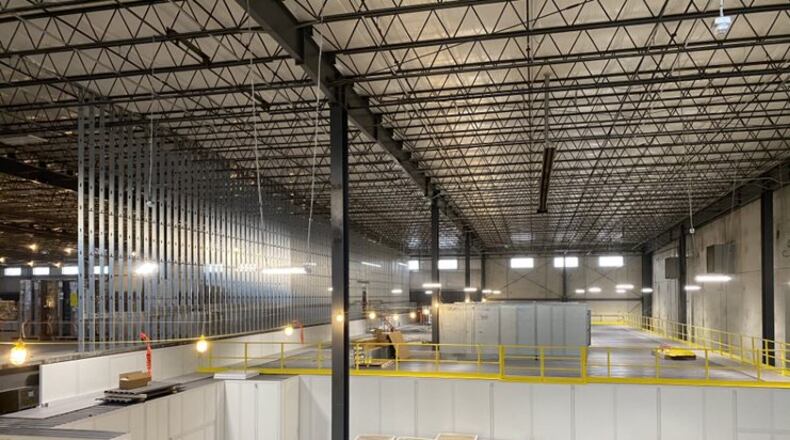That number will soon rise, Peter Mariani, executive vice president and chief financial officer of Axogen, and Todd Puckett, the company’s Dayton-area operations director, said in a recent interview. The company is looking for qualified processing technicians, manufacturing engineers, quality control specialists and more.
“We are finding most of our people locally, which has been a great location for us,” Puckett said when asked if he’s finding the employees he needs in the Miami Valley. “It was so important to stay in the Dayton area.”
The ongoing construction of the Axogen Processing Center involves about 80 local contractors.
A bit of recent history: In 2018, Axogen invested $5 million into the 75,000-square-foot former home near the ever-busy interchange of interstates 70 and 75.
Axogen has taken that local building and added a second floor to part of it, Mariani said. “It’s now up to 100,000 square feet for us.”
But even at the time of that 2018 purchase, Axogen was not new to Dayton. The business had been working with and renting space from its local partner, the Community Blood Center/Community Tissue Services. That relationship has lasted for at least five years now.
The newly expanded Vandalia site will be Axogen’s “biologics processing center,” replacing rented space from the CBC/CTS.
To pursue the company’s next goals, leaders of Axogen knew they needed to take a step forward, moving beyond rented space.
“When we looked at our growth profile over the next several years, and the regulatory transition we’re going through ... we recognized that we wanted and needed to be in control of the entire facility itself,” Mariani said. “And we just needed the space.”
Credit: BLC
Credit: BLC
All told, this is a $50 million investment for Axogen. The business expects about 250 employees over the next three to five years.
Construction in Vandalia started before COVID worst U.S. impact — then paused, Puckett said. Work restarted in January this year, and now local leaders are looking at a project completion at the end of 2022.
With seven acres of land, Axogen will have room for future expansion, as well.
This is a long-term investment,” the CFO said.
“We have a lot invested in our employees,” Puckett said. “The processing technicians really do what we’ll call ‘the magic of the process.’”
Involved is a rigorous six-month training regimen for new employees in certain positions.
“When you invest that much into an employee, a team member, it makes it worthwhile to not just let that go,” Puckett said. “So we’ve been having very good luck in the local area finding what we need.”
What’s driving this growth: Nothing less than a $2.7 billion market, Axogen leaders believe.
Axogen leaders say they are pioneering a new process for human tissue repair, processed in such a way to preserve very important biological cues, washing away cellular debris and allowing surgeons to implant tissue in patients who have had nerve fiber damage.
“That nerve tissue essentially becomes a graft that the nerve fibers are able to repopulate, and you can regrow your nerve fibers — and regain sensation and movement,” Mariani said.
The CFO said the process can take human nerve tissue and convert it to a human allograft, allowing its use from one person to another, he said. Without this process, surgeons rely on tissue “autografts,” or a tissue graft from the patient’s own body.
Said Mariani: “It’s basically the natural building block. Your body’s own cell will populate the graft.”
About the Author



